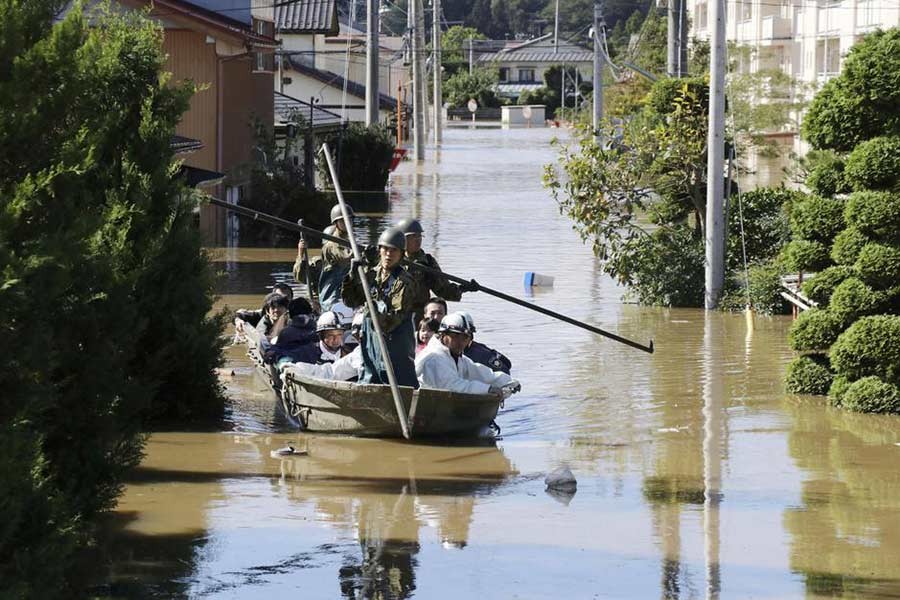Japan sent tens of thousands of troops and rescue workers on Sunday to save stranded residents and fight floods caused by one of the worst typhoons to hit the country in recent history, which killed 23 people and briefly paralyzed Tokyo.
There were also 16 people missing, public broadcaster NHK said, as Typhoon Hagibis left vast swaths of low-lying land in central and eastern Japan inundated and cut power to almost half a million homes.
Landing restrictions at Tokyo’s Narita and Haneda airports were lifted but more than 800 flights were canceled for the day, NHK said, as were some Shinkansen bullet train services to the worst-hit areas.
Authorities lifted rain warnings for the Kanto region around Tokyo, where stores reopened and many train lines resumed operations, but they warned there was still the risk of rivers in eastern Japan overflowing and inflicting fresh damage.
Prime Minister Shinzo Abe convened an emergency meeting and sent the minister in charge of disaster management to the affected areas.
“I extend my condolences for all those who lost their lives and offer my sympathy to all those impacted by Typhoon No.19 (Hagibis),” Abe said.
“With respect to blackouts, water outage and suspension of transportation services, we intend to exert all-out efforts for the earliest recovery ... we ask the public to remain vigilant of landslides and other hazards,” he said.
Some 27,000 members of Japan’s self-defense forces as well as firefighters, police and coast guard members were sent to rescue stranded people in central Japan’s Nagano prefecture and elsewhere, the government said.
NHK said the full extent of the widespread damage was only beginning to emerge because many areas remained under water.
Some 425,000 homes were without power, the government said, reviving fears of a repeat of the weeks-long power outages suffered after another typhoon hit east of Tokyo last month.
In Fukushima, north of the capital, Tokyo Electric Power Co (9501.T) (Tepco) reported irregular readings from sensors monitoring water in its Fukushima Daiichi nuclear plant. The plant was crippled by a 2011 earthquake and tsunami.
Tepco spokeswoman Emi Iwasa said the typhoon triggered 11 leak alerts at the plant. Of those, eight were confirmed as being triggered by rainwater and the rest were still being investigated. Iwasa said the operator had so far not confirmed if any radioactive water leaked into sea.
FLOODS, LANDSLIDES
Hagibis, which means “speed” in the Philippine language Tagalog, made landfall on Japan’s main island of Honshu on Saturday evening and headed out to sea early on Sunday, leaving behind cloudless skies and high temperatures across the country.
NHK showed fields and vast residential areas in parts of central and eastern Japan covered in brown water, with some of the worst damage caused by Chikuma river in Nagano prefecture.
Military helicopters airlifted stranded people from homes near the river, some cradling their children, after they were trapped by water reaching the roofs of their houses.
In Kawagoe, north of Tokyo, rescuers took residents from a flooded aged care facility by inflatable boats and carried them on their backs to safety. They also searched for survivors in homes destroyed in landslides near Tokyo’s suburbs and in Fukushima prefecture, NHK showed.
Authorities at one point issued evacuation advisories and orders for more than 6 million people across Japan as the storm unleashed the heaviest rain and winds in years. Some 166 people were injured in the aftermath, NHK said.
The storm, which the government said could be the strongest to hit Tokyo since 1958, brought record-breaking rainfall in many areas, including the popular resort town of Hakone, which was hit with 939.5 mm (37 inches) of rain over 24 hours.
Just last month, another strong storm, Typhoon Faxai, destroyed or damaged 30,000 houses in Chiba, east of Tokyo, and caused extensive power outages.
The Rugby World Cup match between Namibia and Canada in Kamaishi on Sunday was canceled, although the crucial Japan-Scotland match was set to go ahead. Two matches were canceled on Saturday.
Formula One Grand Prix organisers had also canceled all practice and qualifying sessions scheduled for Saturday but the race went ahead on Sunday.


